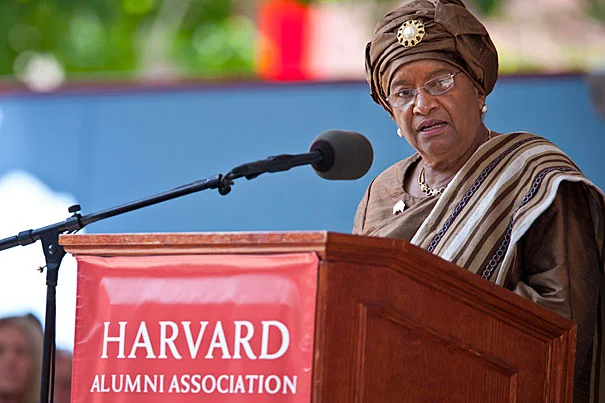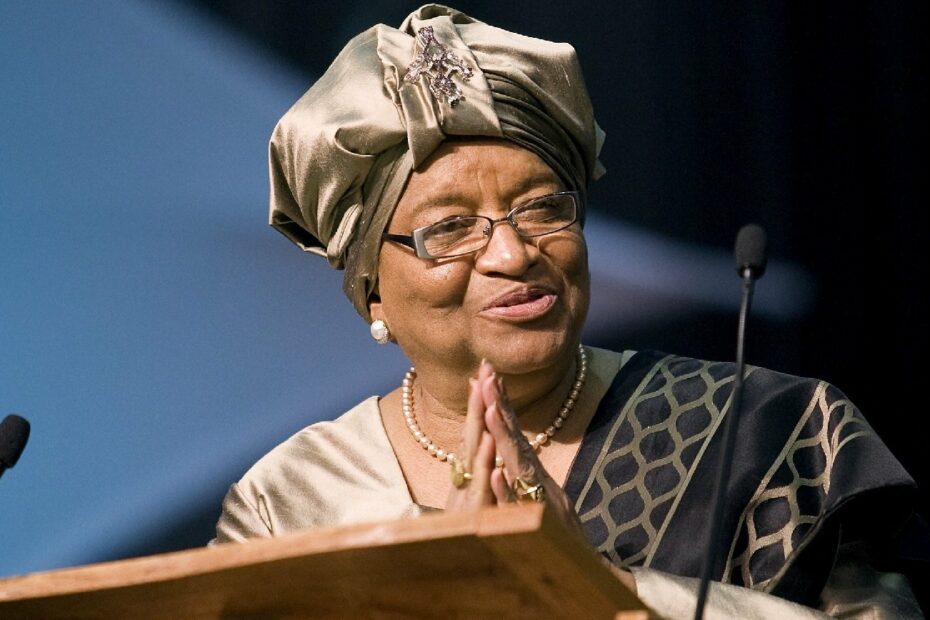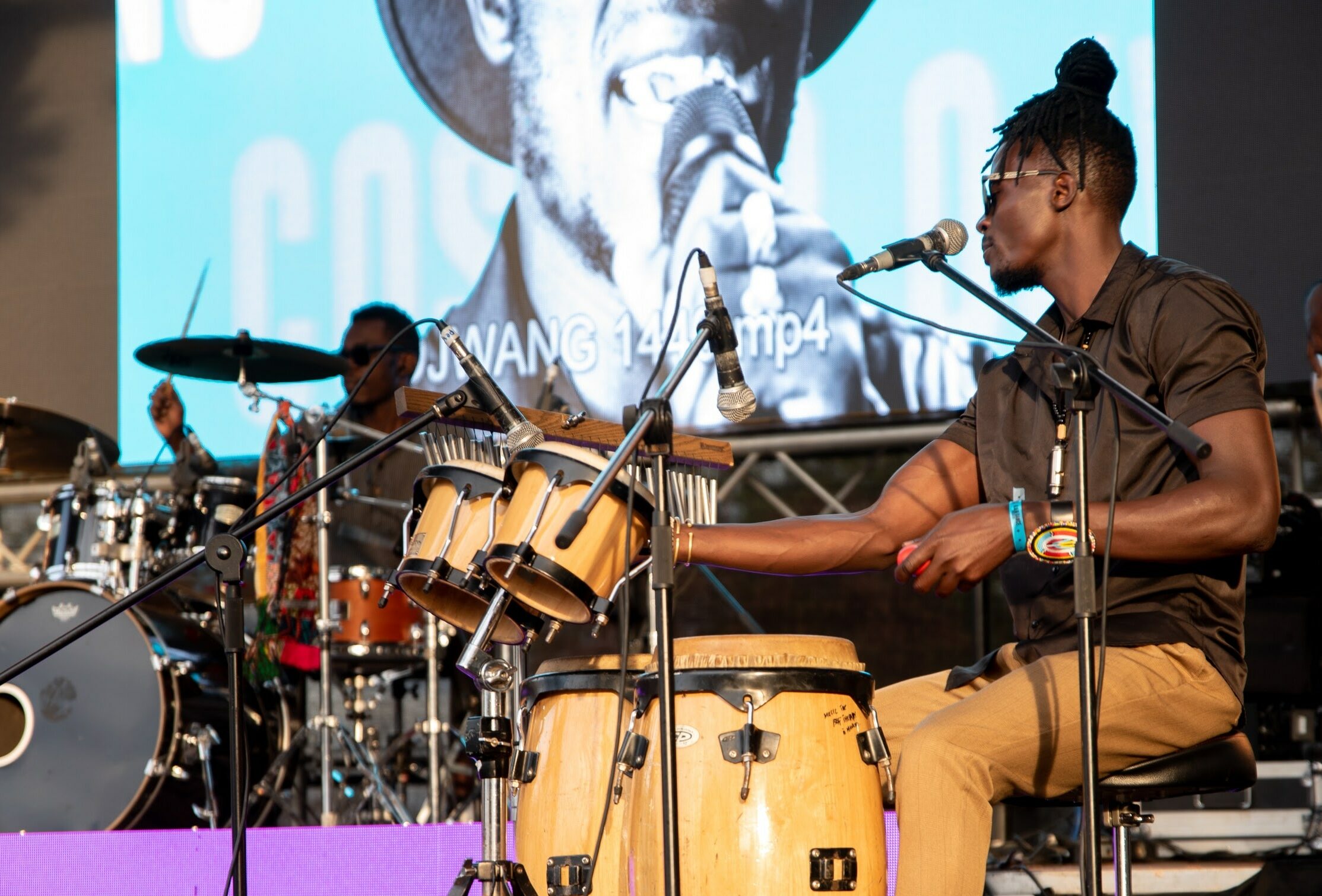Ellen Johnson Sirleaf, nicknamed “Africa’s Iron Lady” and a Nobel Laureate, is a strong advocate for freedom, peace, justice, and women’s empowerment. She became Liberia’s first democratically-elected female president and led the nation through recovery from a long civil war and the Ebola Crisis. Her leadership brought positive changes in Liberia, earning her global recognition, including the Nobel Peace Prize in 2011. Ellen Johnson Sirleaf, Liberia’s First Female President also received honors like the Presidential Medal of Freedom in the US and France’s Grand Croix of the Légion d’Honneur. Forbes also named her among the “100 Most Powerful Women in the World.”
Family Life of Ellen Johnson Sirleaf: Liberia’s First Female President and Nobel Peace Prize Winner
Ellen Eugenia Johnson, later known as President Sirleaf, is the granddaughter of a respected traditional chief from western Liberia and a market vendor from the southeast. Educated in the United States, she holds a master’s in public administration (MPA) from Harvard University’s Kennedy School of Government. Additionally, she has an accounting degree from Madison Business College in Wisconsin and completed a program at the University of Colorado’s Economics Institute. President Sirleaf is an accomplished writer, extensively covering topics related to finance, development, and human rights. Her critically acclaimed memoir, “This Child Will Be Great,” was published in 2008. She is a mother of four sons and a grandmother of 12.
Ellen Johnson Sirleaf as First President of Liberia
President Sirleaf assumed office as President of the Republic of Liberia in 2006, marking a historic moment as Africa’s first democratically elected head of state following the nation’s recent civil war. Before her election, she played a crucial role in the transitional government, overseeing governance reforms and anti-corruption measures.
Reelected in 2011, during her tenure, she concentrated on the country’s reconstruction, drawing in over $16 billion in foreign investments and securing more than $5 million in private funds for rebuilding schools, clinics, and markets. Sirleaf also funded educational scholarships. Notably, she successfully negotiated $4.6 billion in external debt relief and the lifting of UN trade sanctions. This restored Liberia’s access to international markets.
Under her leadership, the national budget increased from $80 million in 2006 to over $672 million in 2012, fostering an annual GDP growth rate of over 7%. In 2016, she made history as the first female Chairperson of the Economic Community of West African States (ECOWAS) for a year. Additionally, in 2012, she was appointed co-chair of the United Nations Secretary-General’s High-Level Panel of Eminent Persons on the Post-2015 Development Agenda, entrusted with shaping a global strategy for sustainable development and recovery.
Early Career of Ellen Johnson Sirleaf, Liberia’s First Female President Top of Form
President Sirleaf embarked on her career in Liberia’s Treasury Department back in 1965. By 1979, she ascended to the role of Minister of Finance, implementing strategies to address governmental financial mismanagement. Following a military coup in 1980, she assumed the presidency of the Liberian Bank for Development and Investment. However, the escalating oppression of the military regime prompted her to flee Liberia that same year. Subsequently, Johnson Sirleaf held positions such as the vice president of Citicorp’s Africa regional office in Nairobi, a senior loan officer at the World Bank, and a vice president at Equator Bank.
Before her initial presidential candidacy, she served as the assistant administrator at the United Nations Development Programme. She was also the director of its Regional Bureau of Africa and the assistant secretary-general of the United Nations. She resigned from this post to contest the 1997 presidential elections. Sirleaf finished second which led to her self-imposed exile in neighboring Cote d’Ivoire (Ivory Coast). During her exile, she established a venture capital platform for African entrepreneurs and founded Measuagoon, an NGO focused on community development in Liberia.
Other Achievements of Ellen Johnson Sirleaf

President Sirleaf has been honored with honorary doctorates from over 15 institutions. They include Tilburg University (Netherlands), the Nigerian Defence Academy, the University of Massachusetts Medical School, Harvard University, and Rutgers University. Others include Yale University, Georgetown University, the University of Abeokuta (Nigeria), the University of Minnesota, Furman University of South Carolina, and Brown University. Also, Indiana University, Dartmouth College, Concordia University, Langston University, Spelman College, and Marquette University, awarded Ellen Johnson Sirleaf, Liberia’s First Female President, with honorary doctorates.
Apart from her Nobel Prize, President Sirleaf has received various prestigious awards. These include:
- The Indira Gandhi Prize for Peace Disarmament and Development (2012),
- The African Gender Award (2011).
- Friend of the Media Award (2010),
- FUECH Grand Cross Award (2009),
- FAO’s CERES Medal (2008).
- Golden Plate Award (2008)
- International Women’s Leadership Award (2008)
- International Crisis Group Fred Cuny Award for the Prevention of Deadly Crisis (2008)
- James and Eunice K. Matthews Bridge Building Award (2008)
- American Academy of Achievement Golden Plate Award (2008).
- Her support for civil right, democracy, and humanitarian rights led her to be awarded National Civil Rights Museum Annual Freedom Award (2007)
- National Democratic Institute Harriman Award (2007)
- Bishop T. Walker Humanitarian Award (2007)
- Gold Medal of the President of the Italian Republic (2006)
- Africa Prize for Leadership for the Sustainable End of Hunger (2006)
- National Reconciliation Award (2006)
- International Woman of the Year (2006)
- International Republican Institute Freedom Award (2006).
Forbes Top 100 Most Powerful Woman
Ellen Johnson Sirleaf, Liberia’s First Female President was named among the top 100 most powerful women in the world by Forbes in 2012. She also became the most powerful woman in Africa by Forbes Africa in 2011. In addition, she was listed among six “Women of the Year” by Glamour in 2010, acknowledged among the 10 best leaders in the world by Newsweek in 2010, and included in TIME magazine’s selection of top 10 female leaders in 2010. The Economist praised her in 2010, calling her “the best President the country has ever had”.
Nobel Peace Prize Winner in 2011

Ellen Johnson Sirleaf received the Nobel Peace Prize for her peaceful endeavors to champion peace and advocate for women’s rights. As the first democratically elected female head of state in Africa, she assumed office in 2005, fostering peace and economic advancements within her country. During her tenure, she bolstered women’s rights, broadened freedom of expression, and set a notable example for other African leaders.
Throughout her nearly 40 years in public service, President Sirleaf faced death threats, imprisonment, and exile while challenging the injustices, corruption, and violence entrenched in Liberian society. Harvard President Drew Faust acknowledged her resilience and dedication to transforming Liberia, expressing pride in welcoming such a revered African leader and staunch advocate of democracy to address the Commencement Day audience.
In her speech, while receiving the award she acknowledged
“Studying at Harvard has been integral to my journey, and I’m deeply honored to be an alumna. I commend my fellow graduates, sharing in our pursuit of academic excellence and truth-seeking.”
Reflecting on her country’s progress, particularly led by the strength and determination of its women, she highlighted Liberia’s transition from conflict to peace, disaster to development, and despair to hope.
“Our nation has moved forward, bridging the gap from turmoil to peace, and it’s the resilience of Liberian women that has been instrumental. They were the driving force, representing diverse backgrounds yet unified in their commitment to ending our civil war. I stand here, proud and humbled, representing the hopes and aspirations not only of Liberian and African women but of women globally.”



